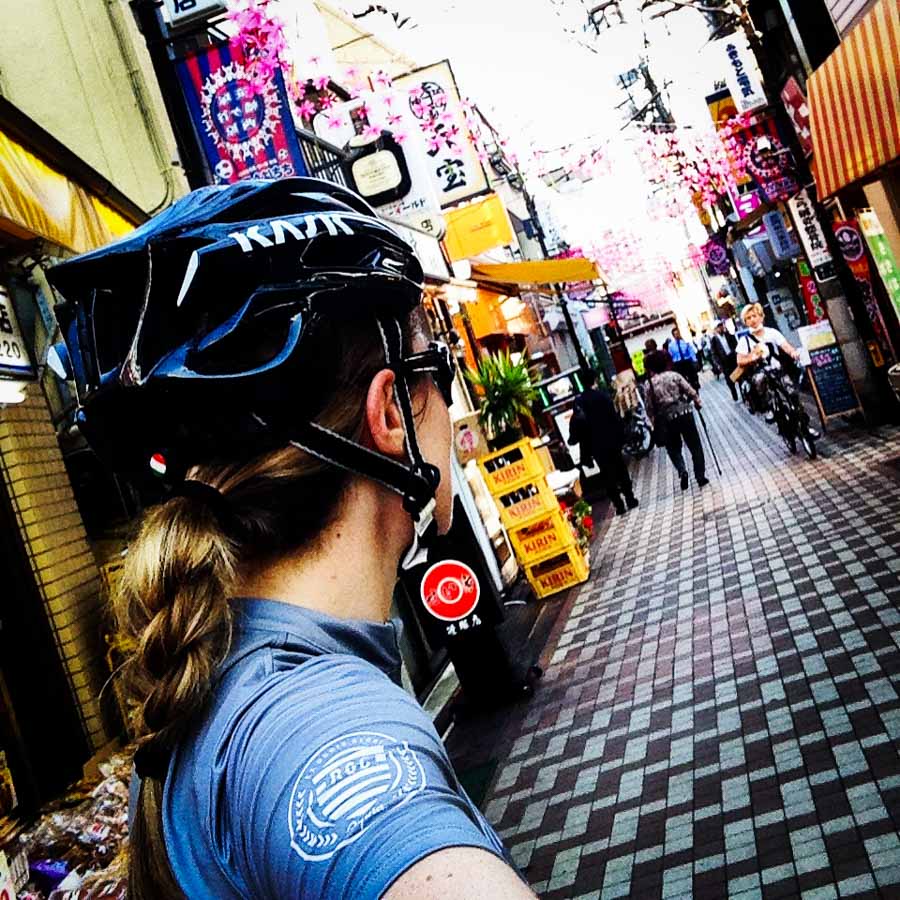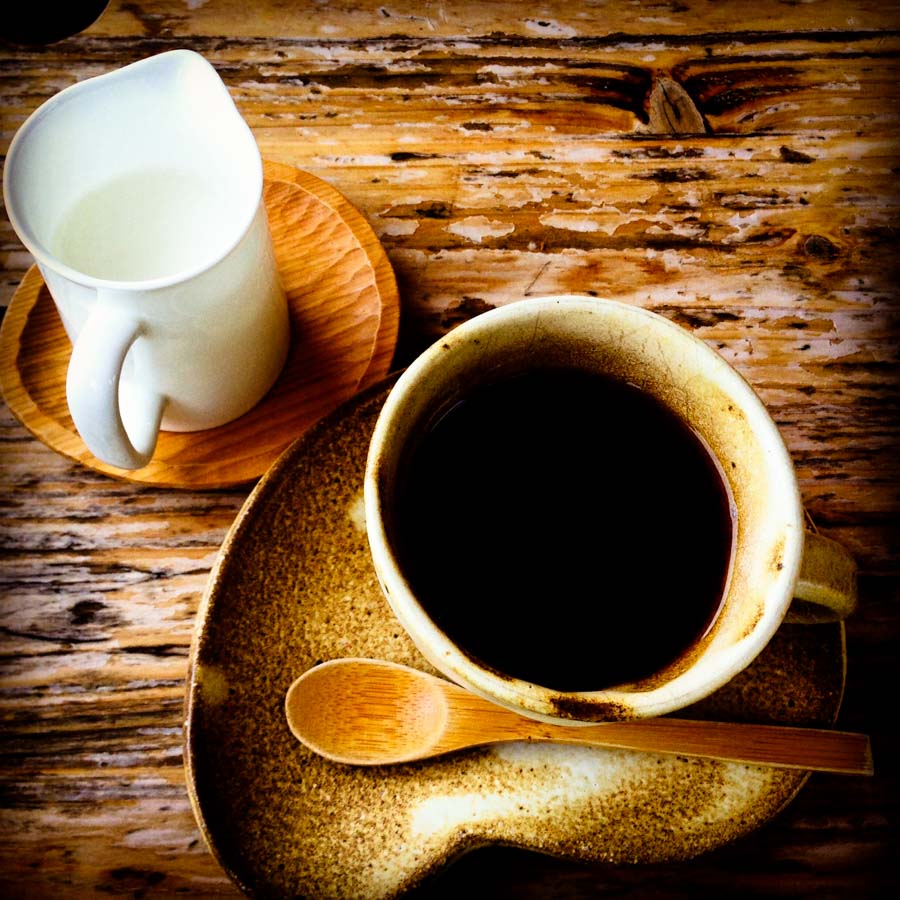Cycling in the Land of the Rising Sun

For most of us combining travelling with cycling is a dream come true. Last week Katie Quinn returned to her second home of Japan, this time with a passion for riding and you'll be surprised at what she found...
Words and Images - Katie Quinn
Ahhhh, Japan. A country of stark contrasts and many traditions. While road riding and cyclocross in Japan is going crazy, cycling in Japan is more than just a hobby; it's a way of life. Most Japanese households, particularly those in major cities, will not own a car due to the prohibitive costs, lack of parking and sheer inconvenience.
This however is of little consequence when they have one of the most reliable public transport systems in the world and millions of bikes, affectionately known as "mamachari", at their disposal.
In a relatively flat city like Tokyo these basket bikes require few or no gears, and provide the rider with a comfortable seat, relaxed posturing and a transport medium that'd make Mary Poppins proud. It's common to see them fitted out with booster seats for kids on the back and discrete locks on the rear. As a standard mode of transport, everyone partakes... Old, young, men and women, whole families, and it's not unusual to see the baskets filled with bags, groceries, even their pets.
Five years ago I lived in Japan and enjoyed whizzing around the backstreets of downtown Beppu on my basket bike. This was my first trip back to Tokyo and I wasn't sure quite what to expect but encountered several pleasant surprises.
Having travelled and ridden casually around many countries, the first thing I found odd, especially in a city with a population of over 10 million, was that there's minimal traffic. The majority of the population are taking longer trips by rail and it's not uncommon for main city streets to be relatively car-free, even during peak times. The lack of traffic is great, but being accustomed to busy Melbourne roads it's somewhat perplexing.
It's a cycling utopia. With minimal traffic, few vehicles and rigid parking rules, there are few cars parked on the streets. When cars do pull over temporarily they put their hazard lights on. This takes a bit of getting used to since we're accustomed to thinking that a blinking rear yellow light means someone's about to either door us or pull out and potentially put an end to our time on two wheels. Instead as you're riding around Tokyo you see the Japanese drivers actively looking for bikes. And when their kids and grandparents alike are getting around on two wheels it all makes perfect sense.
The roads are well maintained and, likely due to being used by fewer vehicles, are in extremely good condition. Cycling in Japan is also very safe. There's a pleasant relationship between cyclists, motor vehicles and pedestrians. Cars give way to bikes and always seem to be driving safely and slowly. Speed limits are purposefully low in built up areas. Pedestrians don't seem fazed with having bikes around them; they walk in a predictable manner and there is an overwhelming sense of order and calmness as people go about their daily business. I don't recall hearing a single toot or a bell rung in anger during my stay.
Cycling on the footpath is not only ok, it's encouraged. Everyone seems to be a pro at riding slowly, with an impressive show of stability and advanced balancing skills on display. When having to wait at an intersection, cyclists will either congregate on the footpath corners or on the road, in front of any zebra crossings or line markings. Lots of cyclists roll through the lights, even when red. Apparently this is a "grey area" within their road rules and as long as the coast is clear then no one seems to mind.
Helmets are the exception rather than the rule. You'll occasionally see them, usually on the noggins of "serious" cyclists, but for the day-to-day commuter they are far from common.
I had the pleasure of heading out with the Rapha Cycle Club Tokyo chapter, and as expected I found their group rides to be organised and punctual. Plenty of similarities to back home, however I was surprised to find that riding two abreast is not acceptable. The flip side is that the roads are quiet and you can carry on your conversations just as easily rolling single file, and they'll love you forever if you can whip out a couple of Japanese phrases.
Bike cafes are still relatively rare, but increasing in popularity. Tokyo now has 13 big bike stores, most with a top-notch coffee machine and area to socialise. And when heading out don't worry about having to stuff your jersey pockets with snacks. There's an abundance of vending machines and convenience stores (Lawsons, 7/11, Daily Yamasaki) with clean bathrooms and healthy snacks a-plenty! Individually wrapped bananas anyone?
With so many bikes around the forward thinking Japanese have an efficient bike storage solution in place. Close to train stations, shops, stadiums and public places you'll be able to find large underground bike parking facilities. These usually provide the first couple of hours of parking for free, after which you may be required to pay a nominal fee. There are stackers, bike park attendants and bicycle supplies such as pumps readily available and free to use. Bicycle theft is extremely rare.
Cycling tours of Japan are increasing in popularity; so with quiet roads, incredible scenery, and vast mountain ranges to discover, you're probably wondering why you haven't gone yet. The standard in Tokyo seems to be that those in search of a bit of vertical will go by train to their starting point. It's fine to bring your bike on the train but it must be in a bike bag, which can be left in the train station storage lockers for the equivalent of a few dollars.
On the downside, getting around Japanese cities without some form of GPS or a capable tour guide can be a navigational nightmare. Despite my wicked sense of direction and most major signs written in romaji (our traditional alphabet) as well as the Japanese hiragana, katakana and kanji, I still managed to get lost. The old windy streets and complex system of rivers and streams means you have to refer back to your map frequently.
After a long day in the saddle the beer is cold, cheap and readily available (from every convenience store!), the food nutritious and delicious, and if you don't mind your cycling buddies getting a look at your saddle sores you can head to the local onsen, the communal hot bath, for a relaxing soak.
In my opinion, when it comes to cycling Japan does it better. I'd encourage anyone that enjoys the road less travelled to give riding in Japan a go.







































Getting out and going long, and riding an epic with mates is one of the most enjoyable and memorable parts of cycling. Yeah, good hit outs of a morning, or on the weekend can be great fun, but the big, hard, long days in the saddle, those are the ones we sit and dream about.